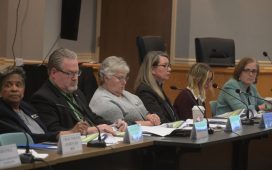Courtney McGowan and “Pippi,” a Fed Biz filly selling at the Keeneland September Yearling Sale.
It’s often true that one never forgets their first time visiting Keeneland, whether it’s for the races or a sale. Courtney McGowan’s version of that story, though, is different than most.
McGowan, 37, first set foot on the Lexington, Ky., property Tuesday evening and unloaded her chestnut Fed Biz filly from the trailer after an eight-hour drive from central Michigan. The filly’s there to sell Thursday as the maiden offering of the McGowan Thoroughbreds program, both as a breeder and a consignor, bringing to a crescendo McGowan’s crash course in chasing her dreams.
“This is the first Thoroughbred I’ve ever bred,” McGowan said. “I’ve been dreaming of this since I was eight years old.”
A native of Northern California, McGowan was introduced to the Thoroughbred world through some family members who raced and bred in the Northwest, and she caught the horse bug early spending her summers on their farms. She’d planned on staying in the region after some time spent in the Mountain Time Zone for school and other pursuits, but that plan changed six years ago when her career as a retail store manager sent her elsewhere.
“I went into the manager training program in Portland, Ore., and I was supposed to go north to Washington, and the next thing I knew, they said, ‘You’re going to Michigan.’” McGowan said. “I went, ‘I’m sorry, where?’”
The job was in Grand Rapids, but McGowan set herself up in Sand Lake, a single-blinking-stoplight town that’ll get you into the city in short order after a quick trip down US-131. She had no family in Michigan, but she had a couple paint horses that came with her on the trip east.
The Michigan-bred program isn’t what it used to be, owing to a decades-long decline that’s left the state without a Thoroughbred racetrack since 2017, but McGowan never lost her love of the breed, and especially its bloodlines, that she developed as a horse-crazy child. When a friend sent her the listing for an unraced Spanish Steps broodmare prospect in Kentucky named Spanish Thunder, the gears started turning quickly.
Sire Spanish Steps didn’t immediately ring a bell for McGowan until she saw he was a full-brother to mega-sire Unbridled’s Song. The mare never raced, owing to a bowed tendon, but she had some Grade 1 winners on her page and McGowan loved her physical. She admitted it was a bit of an impulse buy, but it was a long time coming.
“I had finally come into a financial situation where I could start looking beyond my two riding horses,” she said, “and my best friend was looking online, and sent me this message that said, ‘Oh my God, you have to have this mare.’ Life gets in the way, and you can get discouraged and think, ‘Well, you’re never going to achieve that.’ When I saw that mare, I thought, ‘I’m buying her. We’re doing this.’”
That decision was quick and easy. Choosing Spanish Thunder’s first partner took some time.
“She’s a phenomenal mare – great mind, great conformation, just a compact mare,” McGowan said. “I wanted to find a stallion that could lengthen her out. She has an old bowed tendon, and I wanted a stallion that had some longevity, and I spent many, many hours doing bloodline analysis of what was going to cross the best. I ultimately landed on Fed Biz because I liked his dam line, and I obviously love Giant’s Causeway (the sire of Fed Biz). My ultimate goal was finding a cross for making a successful athlete.”
McGowan admitted to growing up as a city girl, but her approach to her new endeavor was to be hands-on throughout the process. The first time she’d ever crossed over the Kentucky state line was taking Spanish Thunder into the state last spring to be bred.
She tried to be hands-on with the foaling, but the filly had other ideas.
“The baby popped out while I was at work on a Friday,” McGowan said “When I came back, she was on the wrong side of the fence.”
McGowan nicknamed the chestnut “Pippi” after the children’s book character Pippi Longstocking – a fellow free-spirited young redhead.
The newly-minted breeder immediately liked what she saw, and that didn’t change as the filly grew. The mantra of McGowan’s fledgling breeding operation is “attractive on paper, irresistible in person,” and with Pippi, she felt she was onto something.
“She throws a temper, and then looks at you and says, ‘Okay, fine. I’m done,’ and she gets over it,” McGowan said. “She’s got a great brain on her. I can’t complain about her conformation. I can’t find a fault in the filly.
“I want an attractive horse that when you pull them out of the stall, everyone goes, ‘wow,’” she continued. “That’s what I was ultimately going for, and with Pippi, that’s what I got. I’m not just breeding for a racehorse. I want to set up my babies to have the best life during and after racing. I want something that’s attractive to anybody outside of the racing industry.”
Making sure her foals are bred to succeed at a vocation beyond racing factored heavily into McGowan’s mating decision with Pippi. Though Thoroughbreds were the family business, her own hands-on background with horses has primarily been from the Western disciplines, so she was fully aware of all the things a horse can do besides go fast. If McGowan could give her foals a better shot at a productive life after the track through her genetic choices, she was set on doing it.
“I’ve always loved the Thoroughbreds,” she said. “I’ve always loved watching them race, and I love the versatility of them, because a lot of my friends are in the hunter jumper world, which Thoroughbreds excel at after the track. I love that versatility – being able to run flat out, and love running, and being able to transition that into the fearlessness and heart to jump over these amazing jumps, and just love what they’re doing.”
Now that she’s on the sales grounds at Keeneland, McGowan remains a one-woman show, owing both to her status as a small-time seller with just one horse to offer and COVID-19 restrictions keeping some friends away who’d planned on helping her through the process.
Those restrictions also mean consignors are largely letting their showpeople lead their horses through the ring when it’s time to sell this year. If she ends up doing it herself, McGowan will have an especially unique hands-on experience Thursday when offering Pippi, who is cataloged as Hip 3880.
Of course, there are plenty of tough realities the duo will have to stare down as they head to the ring. In a market becoming ever-more selective, Book 6 of the Keeneland September sale can be a tough spot to make commerce happen, especially commerce of any kind of significance. Offering a horse from a state-bred program with no racetrack probably won’t help, either.
Despite the challenges, McGowan is approaching the sale with the long game in mind. Selling the horse under her own shingle instead of through a consignor was a conscious choice, and one she hopes will stick in the memories of shoppers if they like what they see at the end of the shank.
“I have the Western show experience,” she said. “I know how to present a nice-looking horse. I ultimately decided to do that just to get my name out there. Even though I’m a small-time breeder, I’m breeding quality over quantity.”
For someone who’s had a hand in every part in Pippi’s life, from planning the mating to walking her through the ring, opening that hand and letting the filly go might seem wrought with emotional landmines. There is no shortage of tearful goodbyes when a horse and the people responsible for their care part ways, and it’s a long drive back to Michigan with an empty trailer.
McGowan said that wouldn’t be the case with her and Pippi. She’s been preparing from the moment she saw the little redhead on the wrong side of the fence.
“I don’t necessarily think it’s going to be hard,” she said. “Yes, she’s my first foal, and she is kind of the culmination of my dream, but from day one, it’s always been, ‘I’m not keeping her.’ When I first laid eyes on her, the first thing I thought was, ‘Oh my God, she’s red.’ I crossed two bays and I got a red. The second thing I thought was from that moment on, as awesome as this is, I’m in this as a business. As nice as she is, keeping her would be a disservice to her. I can’t hold on to her. She needs to go do something.”
New to the Paulick Report? Click here to sign up for our daily email newsletter to keep up on this and other stories happening in the Thoroughbred industry.
Copyright © 2020 Paulick Report.








